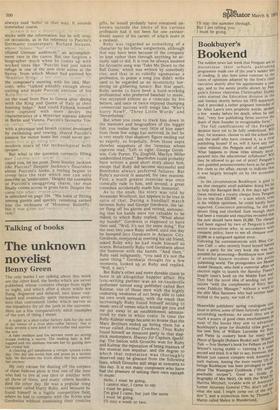The unknown novelist
Benny Green
The only books I am talking about this week are the other kind, the books which are never published, whose contents change from night to night, and which after a short while are flung, dogeared and defaced, into some cupboard and eventually spirit themselves away into that convenient limbo which serves as the repository for all the junk in the universe. Here are a few comparatively adult examples of•the sort of thing 1 mean:
A typist at a shirt-collar factory falls for the son of the owner of a rival shirt-collar factory. She is fired, invents a new kind of shirt-collar and marries
the son.
A fake medium and his servant meet an acting troupe making a movie. The leading lady is kidnapped and the medium rescues her by gazing into his crystal ball. A cleaning girl telephones a certain tycoon every day. One day she meets him and poses as a society lady. He discovers the truth about her but marries her anyway.
My only excuse for dusting off the corpses of these hideous plots is that one of the men who had to live at one time or another with all three of them, and many others besides, died the other day. He was a popular song composer called Harry Ruby, and because he found himself in a highly competitive field, where he had to compete with the Kerns and Gershwins without possessing their creative gifts, he would probably have remained unknown outside the limits of his curious profession had it not been for one extraordinary aspect of his career, of which more in a moment. .
Ruby was regarded as something of a character by his fellow songwriters, although that may have been because of the company he kept rather than through anything he actually said or did. It is true he always insisted his favourite song was 'Take Me Down to the Ball Game,' which was written by somebody else, and that in so rabidly egomaniac a profession, to praise a song you didn't write used to be regarded as an eccentricity bordering on gibbering lunacy. But that apart, Ruby seems to have been a hard-working professional who preferred baseball to music, was accepted almost as a comrade by his betters, and once or twice enjoyed thumping commercial success with songs like 'Who's Sorry Now?', 'Three Little Words' and 'Nevertheless.'
But when you come to track him down in the memoirs and biographies of the bigger fish, you realise that very little of him apart from those few songs has survived. In fact he is very nearly that shadowy figure smiling out so eagerly, so hopefully, from those sepia showbiz snapshots of the 'twenties whose captions read, "Left to right: George Gershwin, Cole Porter, Flo Ziegfeld, Marilyn Miller unidentified friend." Beerbohm could probably have written a good short story about him, except thai Ruby did become successful and Beerbohm always preferred failures. But Ruby's survival is assured, for two reasons. First, a much greater musician was once comically rude to him, and second, a great comedian accidentally made him immortal.
As to the snub, the story was told by Alexander Woollcott, but appears to be true in spite of that. During a handball match between Ruby and George Gershwin, the latter flung off his gloves and retired, announcing that his hands were too valuable to be risked, to which Ruby replied, "What about my hands?'' Gershwin is supposed to have then said, "Well, it's not the same thing." For the next two years Ruby sulked, until one day he bumped into Gershwin in Atlantic City. Gershwin, overjoyed at meeting his old friend, asked Ruby why he had made himself so scarce. Reluctantly Ruby told Gershwin about the business with the hands. "And then," Ruby said indignantly, "you said it's not the same thing." Gershwin thought for a few moments, looked up at Ruby and replied, "Well, it isn't."
But Ruby's other and more durable claim to fame is an altogether happier affair. His lyric-writing partner was an ex-vaudeville performer turned song publisher called Bert Kalmar, one of those men with the highly endeanng weakness of not being able to take his own work seriously, with the result that increasingly Ruby found himself setting to music sets of verses which would get you and me put away in an establishment administered by men in white coats. In time the Ruby-Kalmar songs became so insane that the Marx Brothers ended up hiring them for a revue called Animal Crackers. Thus Ruby found himself an innocent party to that slapstick masterpiece, Hooray for Captain Spalding. The liaison with Groucho won for Ruby and Kalmar the reputation of being masters of the musical non sequitur, and the degree to which that reputation was thoroughly deserved may be gleaned from the following lines, which Groucho still sings at concerts to this day. It is not many composers who have had the pleasure of setting their own epitaph
to music: Hello, I must be going, I cannot stay, I came to say I must be going. I'm glad I came, but just the same I must be going. I'll stay a week or two, I'll stay the summer through, But I am telling you I must be going.


































 Previous page
Previous page